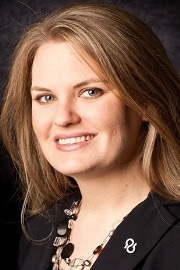My name is Heather Snyder. I am one of the scientists on staff at the Alzheimer's Association. My title is Senior Vice President of Medical and Scientific Relations. In my role, I oversee all of our funding programs and lead a number of different scientific initiatives, including being part of the leadership team for the US POINTER trial. I'm part of the ALZ-NET study team as well, and a few other things.
What are the Alzheimer's Association's current research priorities? And how do they align with the latest advancements in neuroscience?
A key part of the Alzheimer's Association's core mission is to advance research for Alzheimer's and all other forms of dementia. As part of that, we recognize the importance of understanding the biological foundations of Alzheimer's and other diseases that cause cognitive impairment and the need for tools that enable early and accurate diagnosis. Expanding the pipeline of therapeutic interventions is also key, and that includes drug therapies and approaches like behavioral modifications or combination therapies.
At the same time, we understand that many people are living with these diseases today, so developing best practices in care, interventions, and support is equally important. A portion of our funding is also dedicated to these areas.
Beyond funding, we also bring the scientific community together for networking and research discussions on various topics. For example, we have an upcoming meeting on health equity and another in the spring focused on Apolipoprotein E and lipid biology in Alzheimer's. We're always looking for ways to push research forward in all areas of the field.
About the Alzheimer’s Association (English)
Can you highlight any recent breakthroughs in Alzheimer's research that the Association has supported or been involved with?
Two major developments in Alzheimer's research are the emergence of new tools for early and accurate diagnosis as we continue to learn more about the disease and the potential for these tools, like blood tests, to be replicated in clinical trials and used in clinical practice down the line. We've been involved in this space for many years.
The second key area is the need for interventions and therapies that can stop or slow the progression of the disease at all stages. Our **Part the Cloud** initiative is a robust clinical trials funding program that has significantly helped diversify the clinical pipeline in this area.
Additionally, we're one of the largest nonprofit funders in the world focused on multimodal interventions to reduce the risk of cognitive impairment in at-risk populations. Our support includes the US POINTER trial, along with other global initiatives like the Latin American FINGERS trial, the Netherlands FINGERS trial, MET-FINGERS, and many others.
How does the Alzheimer's Association collaborate with neuroscientists at events like SFN? How do you see these partnerships shaping the future of Alzheimer's research?
We're all in this together. Understanding those who have lived with Alzheimer's or other diseases causing cognitive impairment highlights the urgent need to advance research. Our goal is to identify those at greatest risk, detect the earliest signs, and intervene with every evidence-based approach. Equally important is ensuring we provide the highest quality care.
At events like the Society for Neuroscience, our team meets with a number of our awardees. In fact, this afternoon, we had lunch with about 30 of our Alzheimer's Association Research Fellows and Alzheimer's Association Clinical Science Fellows, who were coming together as a networking opportunity to share the latest data and discoveries.
I was at a table with four people from New York, and they didn't yet know one another. So, it really speaks to the importance of collaboration and networking among scientists and sharing the work that we're all doing.
What initiatives is the Alzheimer's Association leading to increase public awareness and education about Alzheimer's disease, particularly within underrepresented or high-risk communities?
This is such an important question, especially in a space where we're deeply committed to our larger mission as an organization. Every year, the Alzheimer's Association publishes Alzheimer's Disease Facts and Figures—an annual report that covers the prevalence and incidence of Alzheimer's and other dementia-causing diseases, as well direct and indirect costs, and the impact on caregivers and the national economy.
Each edition also includes a special report on an emerging topic, which helps emphasize the urgency of these diseases and raise awareness in our communities. It also highlights the available resources, like support groups and educational programs. Right now, we're in the midst of the Walk to End Alzheimer's season, a nationwide event hosted by the Alzheimer's Association, which serves as a key way to build community awareness, connect families, and link them to resources and information.
 Image Credit: fizkes/Shutterstock.com
Image Credit: fizkes/Shutterstock.com
How is the Association working to influence policy changes that can advance Alzheimer's research or improve care for patients and their families?
Another key aspect of the Alzheimer's Association's work as a voluntary health organization is our active public policy team, which focuses on raising awareness about the community's needs, plus advocating for increased research funding and supportive laws and regulations. This has been a top priority for the Association, even before the passage of the National Alzheimer's Project Act in the U.S. Since then, we've seen more than a seven-fold increase in federal research funding for Alzheimer's and related diseases.
What are some of the biggest challenges the Association faces in terms of funding Alzheimer's research? How can the neuroscience community support these efforts?
There’s so much good science out there. One of our challenges is that we receive so many applications, but we can only fund a select few. We know there’s more valuable research that needs to be done. Identifying opportunities for collaboration and synergy is definitely a step forward. We also rely on the scientific community to help us through the peer review process, which is an area where everyone can play a role.
Looking ahead to the next few years, what breakthroughs or milestones does the Alzheimer's Association hope to achieve by 2025?
We’ve recently seen the first FDA approvals in the United States for a new class of drugs that target the underlying biology of Alzheimer's and offer clinical benefits for patients. We're excited to see this pipeline continue to grow, and we hope to see additional treatments in the future, including lifestyle or behavioral interventions, that can help all individuals living with these diseases.
Finally, how does the Alzheimer's Association incorporate the voices and needs of Alzheimer's patients and caregivers into the research and development process?
Absolutely, it’s incredibly important. The Association has established the Early Stage Advisory Group, one of the first initiatives to bring the voices of individuals with Alzheimer's to the forefront. This group has been central to much of our work, ensuring we gather their input at every step. Equally important are the caregivers, who provide care for those living with Alzheimer's and other cognitive impairments. Their perspectives are crucial in shaping discussions around priorities and identifying key needs.
Where can readers find more information?
About Heather Snyder Ph.D.
 Heather M. Snyder, Ph.D., is senior vice president, Medical & Scientific Operations at the Alzheimer’s Association. In this role, she oversees Association funding initiatives that accelerate innovative Alzheimer’s and dementia research and provides opportunities for the global dementia community to connect and collaborate.
Heather M. Snyder, Ph.D., is senior vice president, Medical & Scientific Operations at the Alzheimer’s Association. In this role, she oversees Association funding initiatives that accelerate innovative Alzheimer’s and dementia research and provides opportunities for the global dementia community to connect and collaborate.
Dr. Snyder leads the Association’s International Research Grant Program and other strategic funding initiatives that accelerate promising investigations into our understanding of Alzheimer's and dementia. As the world’s largest nonprofit funder of Alzheimer's research, the Association currently has more than $430 million invested in over 1,110 active projects in 56 countries spanning six continents.
As part of the Association's funding portfolio, Dr. Snyder works closely with the Part the Cloud program, advancing innovative approaches for potential therapies into phase 1 and phase 2 clinical studies. Dr. Snyder has also been instrumental in advancing programs to further explore sex and gender-based differences in disease vulnerability as part of a larger initiative aimed to understand how these biological and genetic factors may shape disease development and progression in women.
Dr. Snyder provides leadership on several of the Association’s cutting-edge scientific initiatives. To increase knowledge of prevention and risk reduction, she serves on the executive team for the U.S. Study to Protect Brain Health Through Lifestyle Intervention to Reduce Risk (U.S. POINTER). Dr. Snyder works with other global leaders on the Association’s International Cohort Study of Chronic Neurological Sequelae of SARS-CoV-2 to better understand the impact of COVID on the brain, including factors that may contribute to Alzheimer’s and other dementia. She is also a study team investigator for the development of the Alzheimer’s Network for Treatment and Diagnostics (ALZ-NET), an initiative to gain insight on FDA-approved novel Alzheimer’s therapies.
Dr. Snyder is the chair of the Department of Defense Congressionally Directed Medical Research Programs for Alzheimer's Disease. She also serves on the Research Committee for the American Heart Association and as the immediate past chair of the Health Research Alliance Board of Directors.
An expert in the field, Dr. Snyder has been featured in numerous TV interviews and print and online news articles, including The New York Times, The Washington Post and The Wall Street Journal.
She holds a Ph.D. in molecular biology from Loyola University Chicago Stritch School of Medicine and a bachelor's degree in biology and religious studies from the University of Virginia.